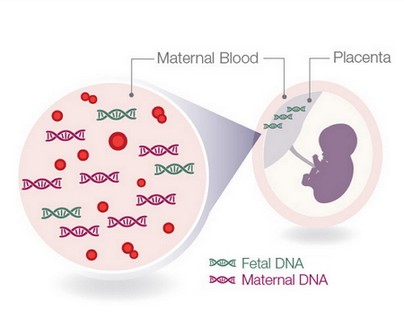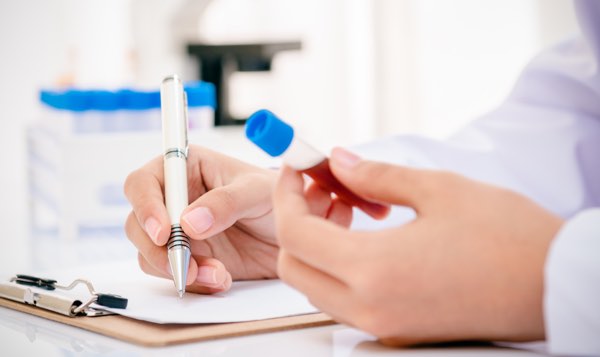NIPT
Non-Invasive Prenatal Tests (NIPT).
Key Points about NIPT
- Near-diagnostic test for trisomy 21 (Down syndrome), >99% detection.
- Tests are for the 80% common major chromosome related problems.
- Results are often available about a week after the mother’s blood is taken.
- It's a blood test only, so there is no procedure risk, unless an abnormality is detected.
- Many problems are not covered by these tests, therefore, a 12 or 13 week ultrasound is still recommended.
- There is no Medicare rebate.


Non-Invasive Prenatal Tests (NIPT)
Non-Invasive Prenatal Tests (NIPT) are blood tests for pregnant women. They give a near-diagnostic level of accuracy for the commonest chromosome problems in pregnancy – trisomies 21, 18 and 13, as well as the option to check for sex chromosome anomalies.
Results are based on ratios of the “fetal” fraction of cell-free DNA in the mother’s blood.
NIPT - from 10 weeks
NIPT can be performed from 10 weeks for women who choose to have it without waiting for first trimester screening, such as women at high risk due to their age. Before 10 weeks there is a greater chance of not getting a result.
The test is suitable for moderately high-risk situations. However, where a definite problem or very high-risk scenario is identified, NIPT is not usually the ideal choice. This is because it is not a definitive test and it does not cover the full range of chromosome problems (20% of significant chromosome abnormalities are not checked). If the test does not give a result, it is usually repeated by the lab at no additional cost.Related Information
- Think you are pregnant? Check with our pregnancy calculator
- Have questions for either pregnancy or gynaecology scans? See our FAQs.
- Have an appointment with us and want to know what to expect? See our patient practical information section.
- Do you need an ultrasound? Make a booking.
- Are you a referring doctor? Request more referral pads.
- Learn more about the team and QDOS Ultrasound.
- Please feel free to provide us with your feedback.
The test is already being used for low risk women. This is because it is the most accurate test available for trisomies and it does not carry any direct miscarriage risk. We, or the referring doctor, can provide guidance sometimes in conjunction with the 12 or 13 week ultrasound for structural abnormalities.

Decision about how much you wish to test
NIPT is mainly to check for trisomies. You will need to decide whether to also have the sex chromosomes checked for anomalies. This is a separate decision from whether you want to know the gender.
This group covers a variety of conditions ranging from very mild to severe problems. Some can be better managed in childhood if the chromosome anomaly is identified from birth, rather than first diagnosed later in life.
Microdeletion screens are offered at extra cost by some labs and can have more problems with accuracy, both false positives and negatives.
It is important to understand that if a very high risk of a chromosome problem such as Down Syndrome is detected on NIPT, a definitive test (Amnio or CVS) is then offered, since there are occasional false positive results in the blood test.
Limitations of NIPT
The test only covers the 80% of the most common chromosome defects found in pregnancy. This includes trisomy 21, trisomy 18, trisomy 13 and potentially, abnormalities of the sex chromosomes. It is not designed to pick up mosaicism (where only some cells are affected) or partial chromosome deletions. Although NIPT is called a “fetal” test, it is really predominately placental DNA that is analysed. This is not usually a problem with the common trisomies but requires careful consideration if a sex chromosome anomaly is found.
Many fetal health problems are not covered by NIPT, so the usual 12/13 week and 19 week ultrasounds are still recommended for structural information.
The main differences in choice of lab are
- Cost In Perth: NIPT costs $395 to $850, with no Medicare rebate.
- Length of time it takes to get a result (usually 1 to 2 weeks) and
- The chance of test failure, varies from <1% to 4%.
At QDOS Ultrasound, we have not aligned with a single lab, so the choice of lab can be tailored for each clinical situation.
Twins – NIPT can be used, and is still a good option even though it does not work quite as well in non-identical twins as in single pregnancy.
These tests are very rapidly developing, please discuss any specific queries with your Doctor or at the ultrasound. For more information, download the pdf below.
CVS And Amniocentesis
Send Us an Email
Contact QDOS Ultrasound
12 Connolly St, West Leederville
PERTH - Western Australia 6007
| Phone | 08 9481 4008 |
| Fax | 08 9481 4080 |
Monday - Friday
8:00 am - 4:45 pm
(strictly by appointment only)
Parking/Transport
Click here for more information.
